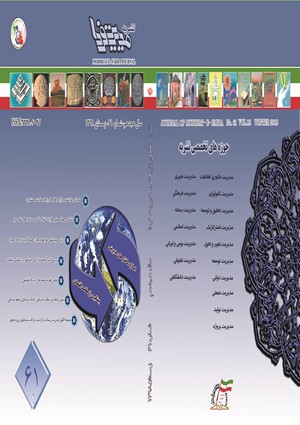حل مساله زمانبندی پروژه در حالت پایدار با محدودیت منابع و موعد تحویل بازه ای
الموضوعات : مدیریت صنعتیمیثم جعفری اسکندری 1 , روزبه عزیزمحمدی 2
1 - دانشگاه پیام نور تهران
2 - دانشگاه پیام نور
الکلمات المفتاحية: زمان بندی پروژه با محدودیت منابع, زمانبندی پایدار, انقطاع فعالیت, موعد تحویل فعالیت, جریمه دیرکرد و زودکرد, الگوریتم NSGA ll, الگوریتم فاخته, ,
ملخص المقالة :
مسئله زمانبندی پروژه در حالت چند وضعیتی با محدودیت منابع یکی از مسایل زمانبندی می باشد که مورد توجه محققان در سال های اخیر به دلایل راهبردی و کاربردی بودن این مسایل در ابعاد عملی و تئوری قرار گرفته است. در این پژوهش زمانبندی پروژه در حالت محدودیت منابع از هر دو نوع تجدیدپذیر و تجدید ناپذیر ضمن اینکه به دنبال کمینه کردن زمان و هزینه های اتمام پروژه که برگرفته از هزینه های متاثر از زمان تحویل فعالیت ها و منابع مصرفی می باشد به دنبال افزایش پایداری شبکه زمانبندی پروژه نیز می باشد تا با بهینه شدن زمان و هزینه پروژه فعالیت ها نیز با بیشترین پایداری ممکن برنامه ریزی و اجرا شوند. این مدل های ریاضی از نوع مسایل NP-Hard (دمیولمستر و هرلن، 2002) به حساب می آید و برای حل آن از الگوریتم های فراابتکاری از جمله ژنتیک2 و الگوریتم فاخته استفاده شده است و با آزمایشات تاگوچی به عنوان یک روش بهینه سازی آماری برای تنظیم پارامتر های ژنتیک2 و فاخته مورد استفاده قرار گرفته و سپس الگوریتم های مورد اشاره با استفاده از آزمون t با یکدیگر مقایسه و نتایج آن مورد بحث و تصمیم گیری قرار گرفته است
1. Malcolm, DG, RoseboomJH, ClarkCE, FazarW, (1959), Application of a technique for research and development program evalution, oper Res 1959; 7:646–69.
2. Kelley, J. E. J. the Critical Path Method: Resource Planning and Scheduling. New Jersey : Prentice Hall, 1963.
3. Johnson, T. J. R. An algorithm for the resource constrained project scheduling Problem. Massachusett : Ph.D. Dissertation, Massachusetts Institute of Technology, 1967.
4. Davis, E. W., (1966), Resource allocation in project network models - A Survey, The Journal of Industrial Engineering 17, 177-188..
5. Petrović, R., (1968), Optimization of resource allocation in project planning, Operations Research, 16, 559-568.
6. Balas, E. Project scheduling with resource constraints, In Anonymous Applications of Mathematical Programming (E.M.L. Beale Ed.). s.l. : The English Universities Press London., 1971.
7. Herroelen, W., De Reyck, B, and Demeulemeester, E., (1998), Resource-constrained Project scheduling: a survey of recent developments, Computers & Operations Research, 25, 279-302.
8. Cheng, J, Fowler, J, Kempf, K, Scott. (2015), Multi-mode resource-constrained project scheduling Problems with non-preemptive activity splitting, Computers & Operations Research, http://dx.doi.org/10.1016/j.cor.2014.04.018.
9. Demeulemeester,E,l & Herroelen,W.S, (2002), Project scheduling, KLUWER ACADEMIC PUBLISHERS, NEW YORK, BOSTON, DORDRECHT, LONDON, MOSCOW,0-306-48142-1.
10. Shadrokh,S, Kianfar,F,(2007), A genetic algorithm for resource investment project scheduling problem, tardiness permitted with penalty.European Journal of Operational Research 181.
11. Khoshjahan, Y, Najafi, AA, Afshar-Nadjafi,B,(2013),Resource constrained project scheduling problem with discounted earliness–tardiness penalties: Mathematical modeling and solving procedure , Computers & Industrial Engineering, Volume 66, 293-300.
12.bashiri.m(2014),Genetic algorithm in single and multi-objective ,shahed university publishers.
13.Tavakkoli moqaddam r,(2013),meta-heuristic algorithms theory and implementation in matlab,islamic azad university-south tehran branch.
14. Rajabion R,(2011), Cuckoo optimization Algorithm,Applied Soft computing,5508-5518.
15. Afshar-Najafi, B., Shadrokh, Sh., (2010), An Algorithm for the weighted Earliness-Tardiness unconstrained project scheduling program, Journal of Applied Sciences, 1651-1659.
16. Ballestin F, Valls V, Quintanilla S., (2009), scheduling projects with limited number of Preemptions, Computers & Operations Research 36, 2913-2925.
17. Cheng MY,Tran D, (2014), Using a fuzzy clustering chaotic-based differential with serial method to solve resource-constrained project scheduling problems, automation in construction ,volume 37 page 88-97.
18. Ghoddousi, P, Eshtehardian, E, Jooybanpour, S, Javanmardi, A., (2013), Multi-mode resource-constrained discrete time–cost-resource optimization in project scheduling using non-dominated sorting genetic algorithm, Automation in Construction 30 216–227.
20. Koulinas, G, Kotsikas, L, Anagnostopoulos, K.,(2014), A particle swarm optimization based hyper-heuristic algorithm for the classic resource constrained project scheduling problem, Department of Production and Management Engineering, Democritus University of Thrace, 12 Vas. Sofias st, 671 00 Xanthi, Greece
21. Moukrim, A,Quilliotb, A,Toussaint, H., (2015), An effective branch-and-price algorithm for the preemptive resource constrained project scheduling problem based on minimal interval order enumeration, European journal of operational research 244,360-368
22. Ranjbar, M, Hosseinabadi, S, Abasian, F., (2013), Minimizing total weighted late work in the resource-constrained project scheduling problem, Department of Industrial Engineering, Faculty of Engineering, Ferdowsi University of Mashhad, Mashhad, P.O. Box, 91775-1111, Iran.
23. Ranjbar,M, Khalilzadeh, M, Kianfar, F, Etminani, K ,(2012), An optimal procedure for minimizing total weighted resource tardiness penalty costs in the resource-constrained project scheduling problem , Computers & Industrial Engineering, Volume 62, Issue 1, February ,Pages 264-270
24. Shahsavar M, Niaki, Najafi A.A,(2010), An efficient genetic algorithm to maximize net present value of project payments under inflation and bonus-penalty policy in resource investment problem. Advances in Engineering Software, 41, 1023-1030.
25. Tavana, M, Abtahi, A R, Khalili-Damghani, K., (2014) , A new multi-objective multi-mode model for solving preemptive time–cost–quality trade-off project scheduling problems, Expert Systems with Applications 41, 1830–1846.


